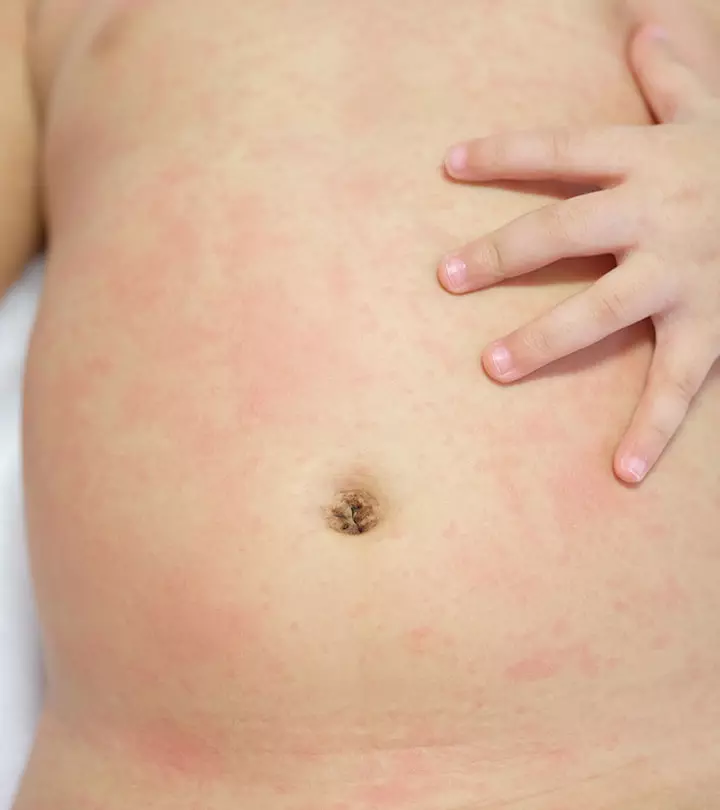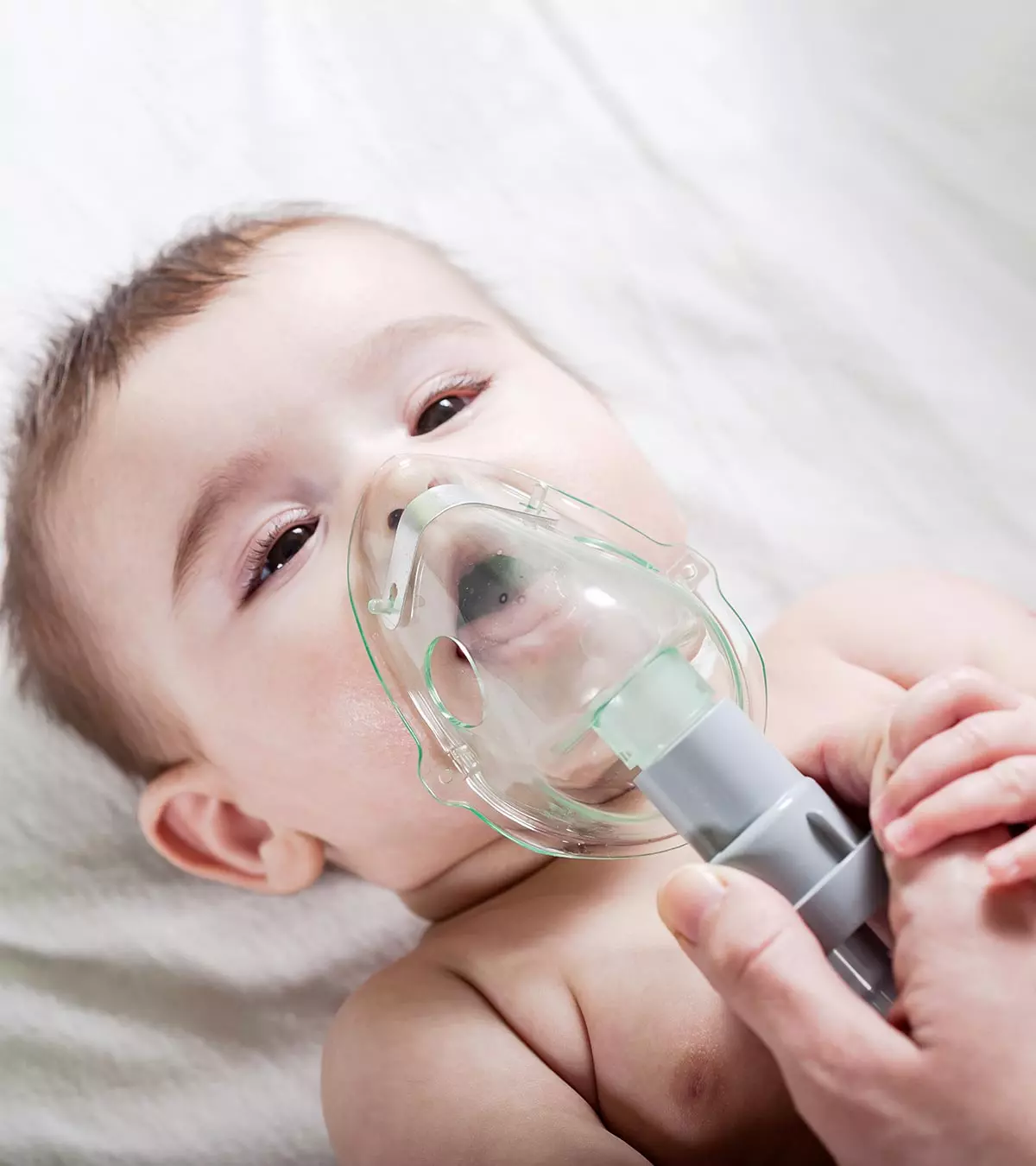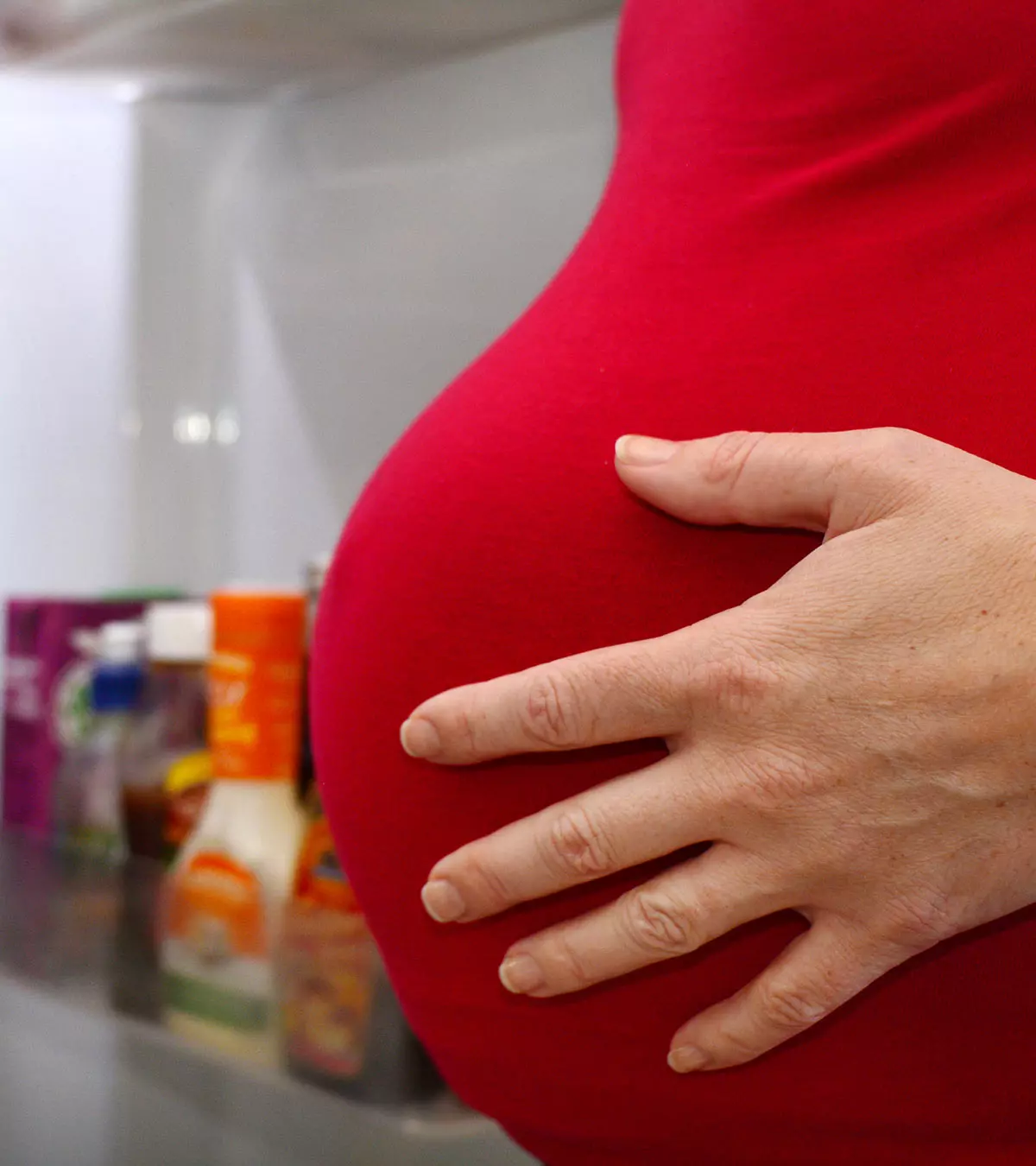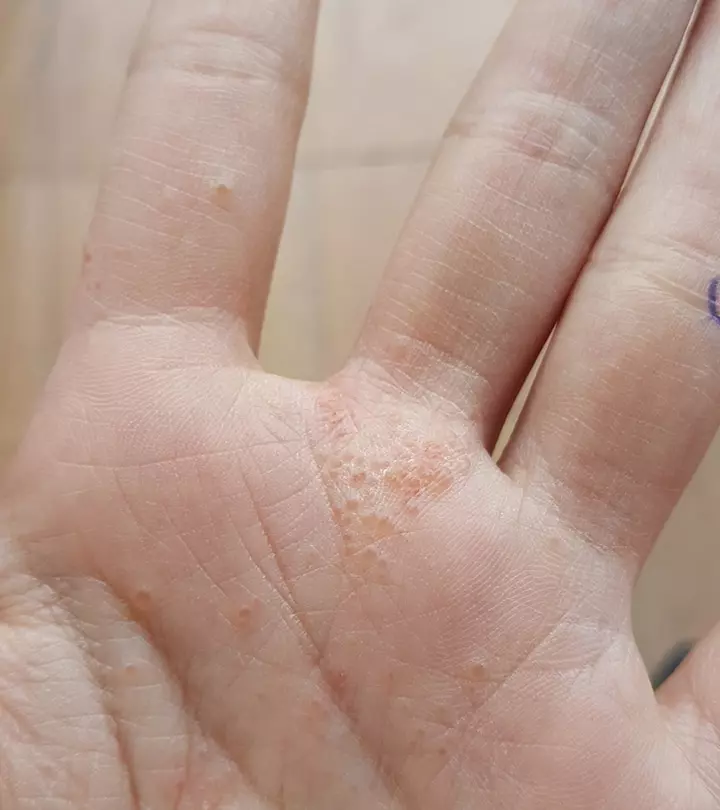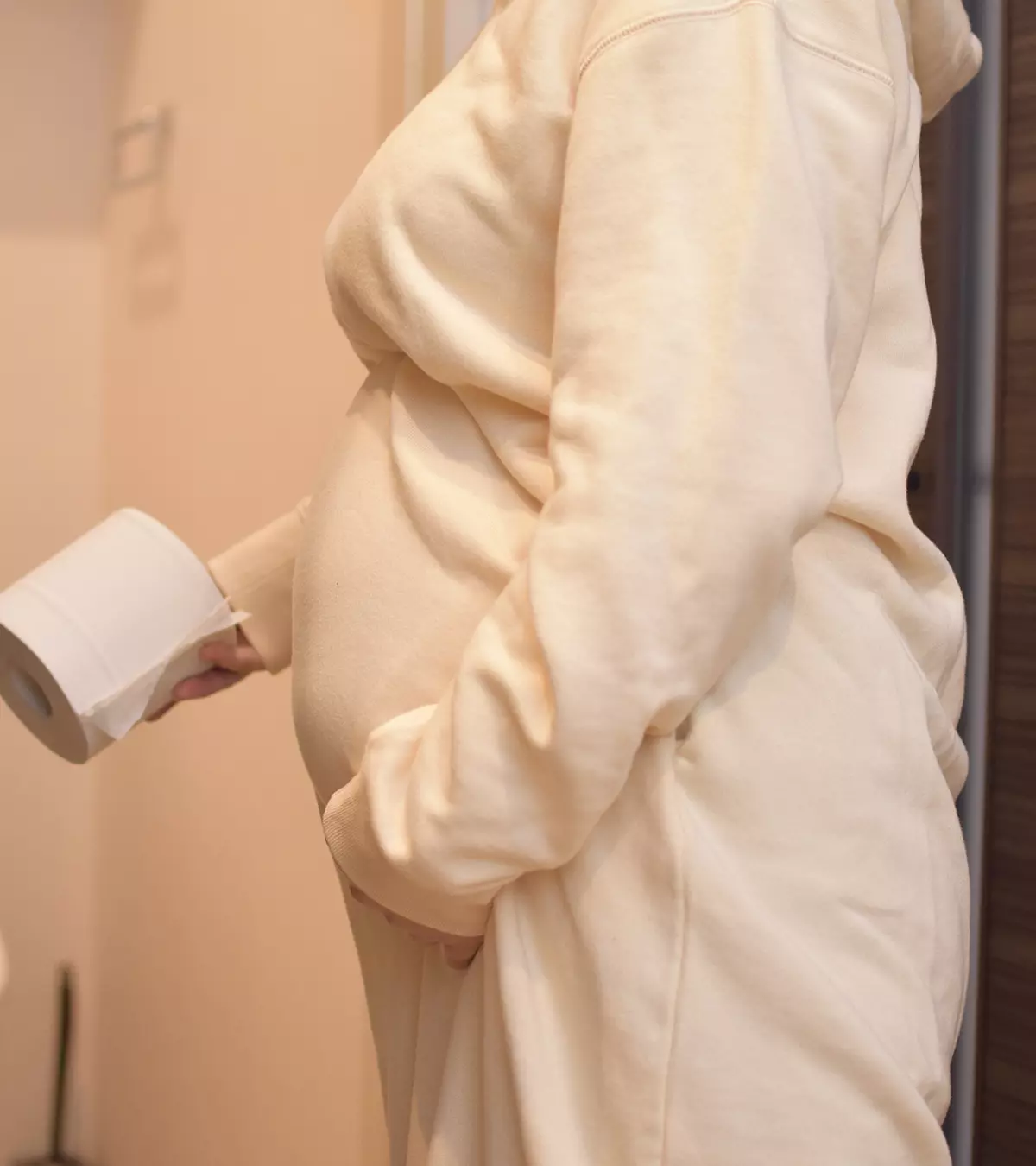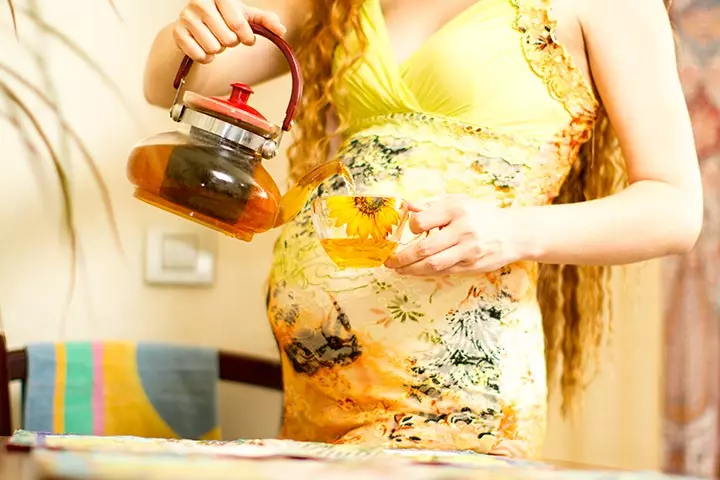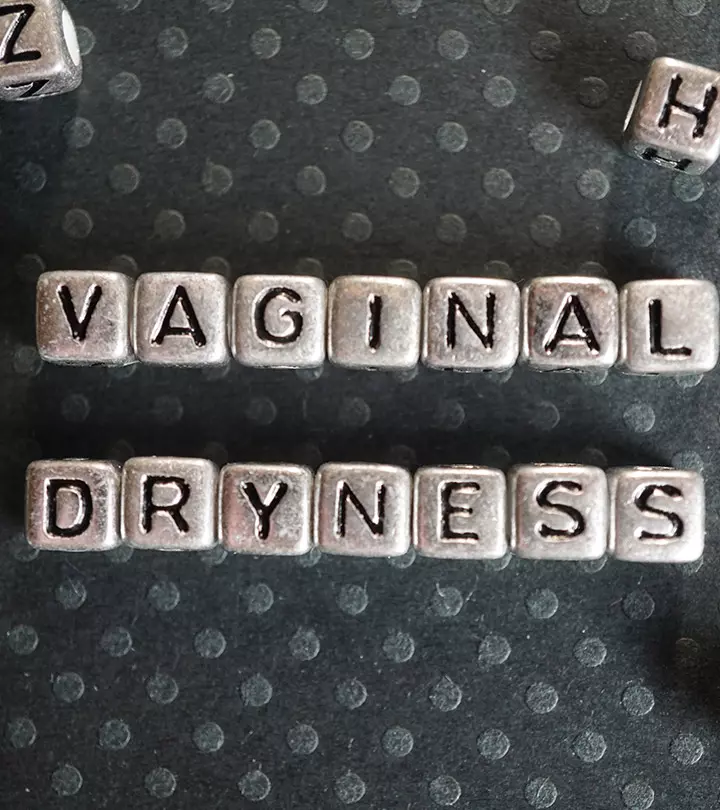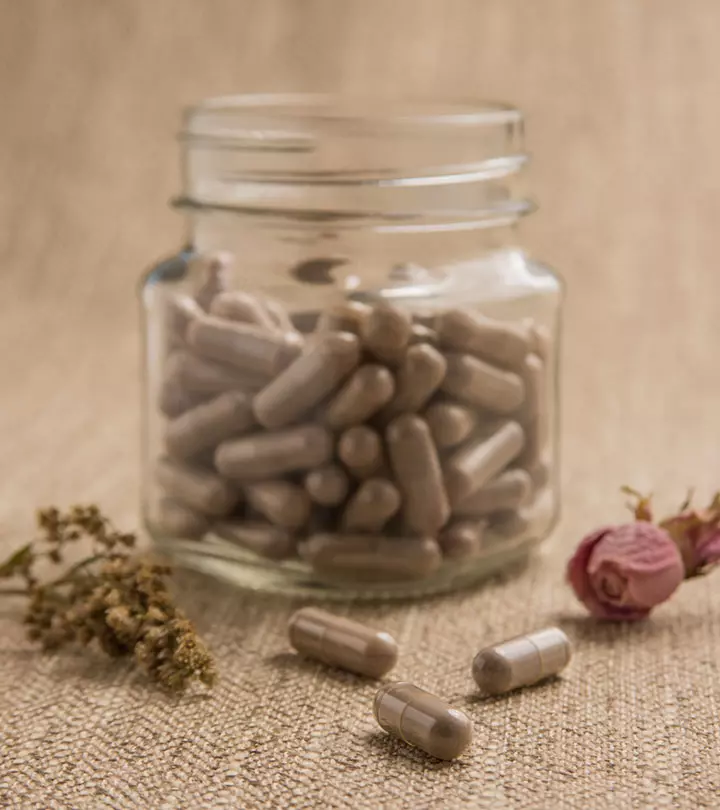
Image: iStock
A jelly-like discharge during pregnancy is a vaginal discharge that appears and feels like mucus. Although considered a normal occurrence in pregnant women, it may become concerning if there is a foul smell or change in the consistency and color. Additionally, if the discharge is accompanied by itchiness or blood in the vaginal area, a doctor’s intervention may be necessary.
This post will tell you about this type of pregnancy discharge, including its causes and complications.
Key Pointers
- Due to increased hormonal activities and blood flow, a jelly-like discharge appears through the vagina during pregnancy.
It is thin and transparent in texture with no strong odor at all. - An increase in discharge can occur during different stages of pregnancy, such as in the third trimester.
- If the discharge is accompanied by itching, blood or has a strong odor, it may indicate an infection and should be evaluated by a doctor.
Is It Normal To Have A Jelly-like Discharge In Pregnancy?
Jelly-like discharge during pregnancy is often the result of hormonal changes, but it’s important to pay attention to the color and consistency in case it indicates a more serious issue. You are likely to have a jelly-like discharge towards the end of your pregnancy (1). In some cases, this kind of discharge, along with other symptoms, may indicate an infection or any other medical condition that only a doctor can evaluate.
In some cases, jelly-like discharge may be a sign of complications like miscarriage, ectopic pregnancy, or fetal abnormalities, so it’s important to report any unusual symptoms to your healthcare provider. Any of the following signs and symptoms, along with jelly-like discharge, could indicate a medical condition that should be evaluated by a healthcare professional (2).
- Swelling and pain in the vaginal area
- Itching and burning sensation while urinating

Image: Shutterstock
- Thick discharge that looks like curdled milk or cottage cheese instead of being flowy.
- Discharge smells foul and gives strong odor
- Change in color or consistency, including blood
Although jelly-like discharge is usually nothing to worry about, it’s important to be aware of the signs of amniotic fluid leakage or placental problems that could occur due to an underlying problem. Knowing what causes this abnormal discharge helps in dealing with it better.
What Causes Jelly-like Discharge During Pregnancy?
Vaginal discharge during pregnancy
changes both in amount and consistency. In early pregnancy, the discharge is thin and milk-white. However, as the pregnancy progresses, your body produces more estrogeniA sex hormone linked to the aspects of the female reproductive system, including menstruation as well as excess blood that flows to the uterus and vaginal area. Therefore, the mucus glands of the cervix are more active than usual and secrete excess mucus (1). The extra mucus discharge gains a jelly-like consistency as it mixes up with dead vaginal and cervical cells, and natural bacteria that inhabit the vagina.
 Quick fact
Quick factJelly-like Discharge In The Third Trimester
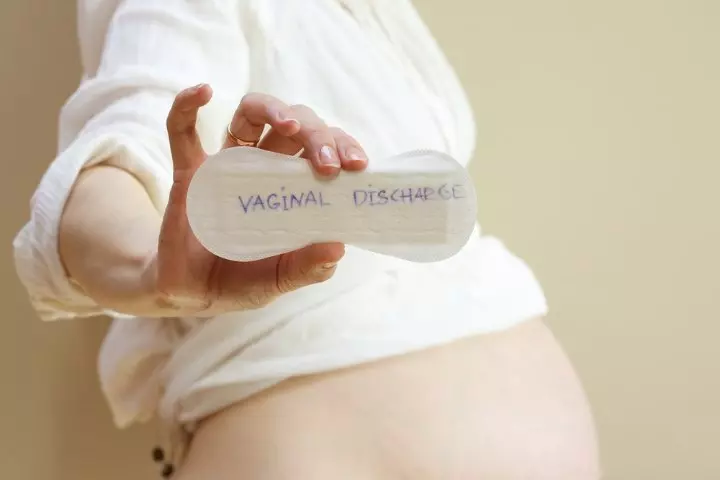
Image: Shutterstock
Dr. Daniel Boyer, MD, who focuses on medical research at Farr Institute, West Des Moines, Iowa, says, “During your final trimester of pregnancy, if the jelly-like vaginal discharge is clear or white, it is likely to be normal secretions. If it is discolored or has a foul odor, it could be a sign of infection. It is vital to consult your doctor if you have any concerns.”
As you approach your due date, the vaginal discharge may be different from the discharge you had until this point (1). This happens because of the mucus plug from the vagina, which has a jelly-like appearance.
The mucus plug is a clump of cervical mucus that blocks the cervix during pregnancy. It protects the baby from infections and other germs. As your body gets ready for labor, the mucus plug loosens and passes through the vagina. It might come out as you reach the 36th week of pregnancy. It appears jelly-like or stringy and can come out all at once or in small amounts streaked with blood (3).
Robin Ren, a mother of two, recounts her encounter with a sticky discharge as she neared the end of her pregnancy. She recalls, “During my second pregnancy, the mucus plug fell out in pieces over the span of about 30 hours. I kept seeing a thick clear mucus discharge mixed with pink blood in my underwear. I continued to have this “spotting” up until it was time to deliver (i).”
 Did you know?
Did you know?When Is Vaginal Discharge A Warning Sign Of An Infection?

Image: IStock
The vaginal discharge could also be a sign of other infections, such as:
- Yeast infections: You may experience inflammation of the vulva and the vagina (Vulvovaginitis). The other symptoms are vaginal discharge along with itching, irritation of the vaginal area, foul vaginal odor, and a burning sensation while urinating, also can present pain during intercourse. These symptoms could suggest that you have a yeast infection that is usually caused by a fungus (Candida albicans). The presence of glucose in the urine and vaginal discharge may be favorable for the yeast to multiply (4).
- Bacterial vaginosis: You are likely to have a gray or white fishy-smelling discharge along with other symptoms, such as irritation, itchiness, and burning sensation in the vagina. It may be due to the bacterial vaginosis that is caused by the overgrowth of anaerobic bacteria (5).
- Sexually transmitted infections (STIs): You may have foul-smelling yellow discharge that is frothy in the case of Trichomonas vaginalis. Other symptoms could be itchy vulva and vagina, soreness, and painful urination. You may develop STIs if you or your partner are at risk of HIV. This could increase your possibility of preterm labor or delivery too (5).
If you find that the sticky discharge is due to infection, do not try self-medicating. See your doctor for a proper diagnosis and treatment as untreated maternal infection can adversely affect the baby. Group B streptococcus (GBS)is a bacteria that can cause vaginal infection that can cause changes in vaginal discharge. Hence, pregnant women are routinely screened for GBS between 35 and 37 weeks of pregnancy.
How Is The Jelly-like Discharge Due To Vaginal Infection Treated?
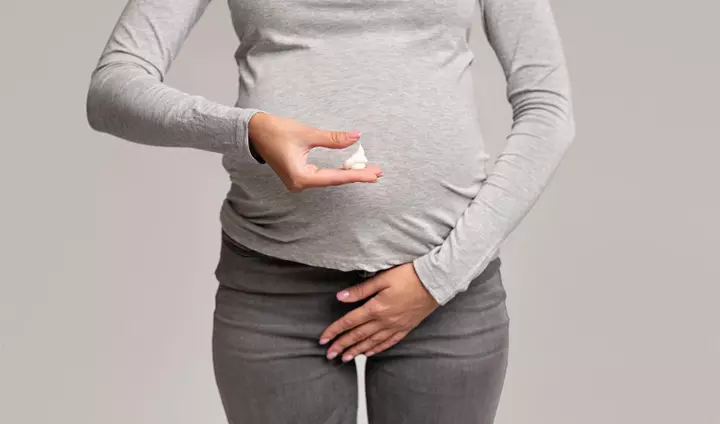
Image: IStock
Treatment for vaginal infections and discharge will depend on the cause of infection.
- For yeast infections, antifungal tablets, ointments, creams, and suppositories may be prescribed.
- For bacterial infections, metronidazoleiAn antibiotic used to treat common bacterial and parasitic infections in the skin, vagina, heart, lungs, bones, and joints tablets or cream, clindamycin gel, or cream may be prescribed (5).
- For trichomoniasis, metronidazole or tinidazoleiAn antibiotic used to treat several bacterial infections, including infections in the intestines and vagina tablets may be given (5).
Your doctor would suggest the dosages according to the severity of the infection. As per the National Institutes of Health (NIH), patients who undergo treatment and are asymptomatic don’t need routine check-ups. Nonetheless, it’s crucial to remember that approximately 30% of these patients might encounter a relapse after three months or beyond. As such, it is essential to take good care to prevent infections in the future.
 Research finds
Research findsHow To Deal With Vaginal Discharge During Pregnancy?
An increase in jelly-like, mild-smelling discharge is normal, but if it also has an unusual odor and color, it may indicate an infection
. While the infections could be treated by antibiotics and other medications prescribed by your doctor, you can take some measures to maintain vaginal health and prevent further infections and complications (6).
- Wear panty liners to absorb the discharge, only if it is too much. If you do so, ensure that it will be changed often since prolonged use may also lead to increased bacterial infection.
- Wear underwear made of cotton and breathable fabric.
- Dry the genital after passing urine or stool, and also after showering. Always wipe the genital region from front to back while cleaning.
- Choose unscented feminine hygiene products, including panty liners, soaps, and toilet paper.
- Avoid douching, tampons, bubble baths, and scented toilet material.
- Avoid douching, tampons, bubble baths, scented toilet material.
- Include a healthy diet and do not take excess sugars as they may promote yeast infections.
- Try including probiotic foods and supplements that may help prevent bacterial imbalances in the vagina.

Image: IStock
 Quick tip
Quick tipNext, we address a few commonly asked questions about vaginal discharge during pregnancy.
Frequently Asked Questions
1. How does the discharge look like in early pregnancy?
Usually, vaginal discharge is clear, milky white, thin, odorless, or mild smelling. Changes begin to happen as early as one to two weeks of conception, and they become prominent as the pregnancy progresses.
2. Is clear jelly-like discharge a sign of pregnancy?
It is not necessarily a sign of pregnancy since jelly-like discharge could also happen in case of vaginal infections that might develop from yeast and bacteria, and sexually transmitted diseases, such as Chlamydia trachomatis, Neisseria gonorrhoeaeiA sexually transmitted disease that infects the reproductive tract, including the cervix, uterus, and fallopian tubes , and Trichomonas vaginalis (5).
3. Is early pregnancy discharge stretchy?
Usually, cervical fluid is slippery and stretchy during the fertile period. It is the time of ovulation when sperm can fertilize an egg, and therefore you may notice your discharge to be clear, thick, and stretchy (7).
4. Why do I notice jelly-like discharge after sex?
Dr. Boyer observes, “The jelly-like discharge after sex is just a result of excessive dryness in the vagina and not a life-threatening problem. You may also experience itching and a burning sensation in the vagina along with the discharge. Take a warm bath or shower before sex, use a lubricant, add moisture to your daily routine by using an additional moisturizer, and avoid using soaps that are drying in private areas.”
5. How long does a jelly-like discharge last?
The jelly-like discharge usually lasts for about four days. If your menstrual cycle is 28 days, the fertile cervical mucus will likely appear around days 10 to 14 (11).
6. Why do I have vaginal discharge every day?
It is normal to have some amount of vaginal discharge every day, provided it is clear. Vaginal discharge is mainly made up of cells and bacteria and helps keep the vagina clean and healthy (12).
7. Can too much stress cause vaginal discharge?
Stress can cause an increase in the levels of stress hormones, such as cortisol, which can disrupt the estrogen-progesterone balance in the body. This disruption in hormone levels can increase or decrease the amount or consistency of the vaginal discharge. Some studies highlight that higher psychological stress is linked to increased bacterial vaginosis prevalence (13).
Jelly-like discharge during pregnancy can be normal if it is not accompanied by concerning signs and symptoms. Extra mucus secretions due to increased blood flow and estrogen levels could be culprits of normal discharge. Foul-smelling discharge, burning or itching sensation in the vagina, curdled milk appearance of the discharge, and color changes such as blood in discharge may require doctors’ attention. It is better treated before delivery to avoid complications.
Infographic: How To Know If Jelly-Like Discharge Is A Sign Of Labor?
Some women may have jelly-like mucus discharge a few days or weeks before delivery. While a few may have this vaginal discharge at the time of labor, some may have discharge way before their due date. Go through the infographic to know how accurate it is to consider jelly-like discharge as a sign of labor. Illustration: Momjunction Design Team
Illustration: Jelly Like Discharge During Pregnancy: Is It Normal?

Image: Dalle E/MomJunction Design Team
Are you concerned about the jelly-like discharge you are having during pregnancy? Watch this video to learn more about this symptom and ways to deal with it.
Personal Experience: Source
MomJunction articles include first-hand experiences to provide you with better insights through real-life narratives. Here are the sources of personal accounts referenced in this article.
i. I thought my water broke but turns out I just peed myself.https://medium.com/@love.and.other.nugs/i-thought-my-water-broke-but-turns-out-i-just-peed-myself-c1e0f3cbc522
References
1. Vaginal discharge in pregnancy; NHS (2018)
2. Vaginal discharge; nidirect.gov
3. What to Know During Your Pregnancy: Weeks 34-42; UNM Hospitals (2018)
4. Mandal SM, Mahata D, Migliolo L, et al.; Glucose directly promotes antifungal resistance in the fungal pathogen, Candida spp; J Biol Chem. 2014
5. Des Spence and Catriona Melville; Vaginal discharge; BMJ (2007)
6. Vaginal Yeast Infections – Women’s Health Guide; U.S. Department of Veterans Affairs
7. Pregnancy – identifying fertile days; U.S. Department of Health and Human Services National Institutes of Health (2020)
8. Vaginal discharge during pregnancy; Pregnancy, birth and baby, Australia
9. Xin Yee Ang et al.; Probiotics Reduce Vaginal Candidiasis in Pregnant Women via Modulating Abundance of Candida and Lactobacillus in Vaginal and Cervicovaginal Regions ; NCBI (2022).
10. Is it safe to douche during pregnancy?; ACOG
11. Cervical mucus; My Cleveland Clinic
12. Vaginal discharge; My Cleveland Clinic
13. The association of psychosocial stress and bacterial vaginosis in a longitudinal cohort; National Library of Medicine
Community Experiences
Join the conversation and become a part of our nurturing community! Share your stories, experiences, and insights to connect with fellow parents.
Read full bio of Dr. Karla S. Sanchez-Banos
- Dr. Daniel Boyer is a practicing Doctor of medicine at Carabobo Football Club, Dallas, Texas. He did his BS from Liceo Carabobo and MD from Carabobo’s University.
 Dr. Daniel Boyer is a practicing Doctor of medicine at Carabobo Football Club, Dallas, Texas. He did his BS from Liceo Carabobo and MD from Carabobo’s University.
Dr. Daniel Boyer is a practicing Doctor of medicine at Carabobo Football Club, Dallas, Texas. He did his BS from Liceo Carabobo and MD from Carabobo’s University.
Read full bio of Rebecca Malachi
Read full bio of Dr. Ritika Shah
Read full bio of Reshmi Das











